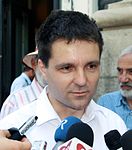Romanian legislative election, 2016
|
|
|||||||||||||||||||||||||||||||||||||||||||||||||||||||||||||||||||||||||||||||||||||||||||||
|---|---|---|---|---|---|---|---|---|---|---|---|---|---|---|---|---|---|---|---|---|---|---|---|---|---|---|---|---|---|---|---|---|---|---|---|---|---|---|---|---|---|---|---|---|---|---|---|---|---|---|---|---|---|---|---|---|---|---|---|---|---|---|---|---|---|---|---|---|---|---|---|---|---|---|---|---|---|---|---|---|---|---|---|---|---|---|---|---|---|---|---|---|---|
|
|||||||||||||||||||||||||||||||||||||||||||||||||||||||||||||||||||||||||||||||||||||||||||||
|
All 329 seats in the Chamber and all 136 seats in the Senate |
|||||||||||||||||||||||||||||||||||||||||||||||||||||||||||||||||||||||||||||||||||||||||||||
| Turnout | 39.44% | ||||||||||||||||||||||||||||||||||||||||||||||||||||||||||||||||||||||||||||||||||||||||||||
|
|||||||||||||||||||||||||||||||||||||||||||||||||||||||||||||||||||||||||||||||||||||||||||||
|
|||||||||||||||||||||||||||||||||||||||||||||||||||||||||||||||||||||||||||||||||||||||||||||
Legislative elections were held in Romania on 11 December 2016. They were the first held under a new electoral system adopted in 2015, which saw a return to the proportional electoral system last used in the 2004 elections. The new electoral legislation provides a norm of representation for deputies of 73,000 inhabitants and 168,000 inhabitants for senators, which decreased the number of MPs. A total of 466 parliamentary seats (308 deputies, 18 minority deputies, and 134 senators) were contested, compared with the 588 parliamentarians elected in 2012. The diaspora was represented by four deputies and two senators, elected by postal vote. The elections saw a turnout of 39.5%, lower than in 2012 but slightly higher than in the 2008 elections.
The legislative election of 2016 unfolded differently compared to 2012 and 2008. On 24 February 2015, the Electoral Code Commission decided in principle for the future electoral law to return to party-list proportional representation, thereby relinquishing the first-past-the-post (uninominal) voting system as introduced in 2008. The option of turning the Parliament of Romania into a perfectly bicameral parliament, with some 300 deputies being elected on a closed list and 100 senators being elected by a single-round uninominal majority vote, had been discussed for years and even agreed upon between the ruling Social Democratic Party and the opposition. The new electoral law promulgated by President Klaus Iohannis on 20 July 2015 however didn't retain uninominal constituencies for the Senate. Closely sticking to the commission's recommendations, the new electoral law completely returned to party-list proportional representation.
...
Wikipedia






